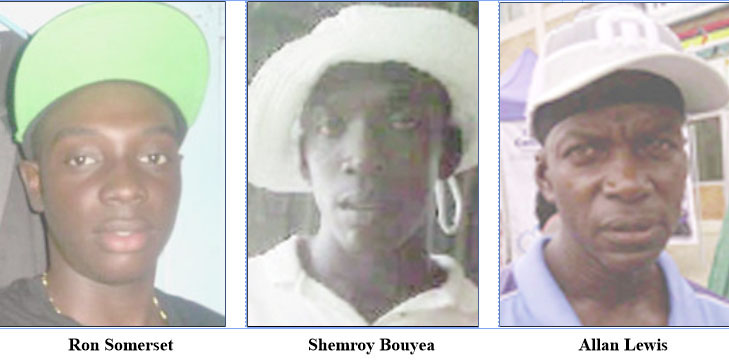Eight years after three Linden men were shot and killed by police during a protest against the former government’s proposed cut in electricity subsidies, the state has agreed to pay a total of $77 million to their families to settle wrongful death lawsuits that were filed.
Consent orders based on settlements brokered between the state and the estates of Allan Lewis, Ron Somerset and Shemroy Bouyea were issued earlier this month by Justice Franklin Holder.
According to the court orders seen by this newspaper, the estates of Bouyea and Lewis will receive $25 million each as compensation, while the estate of Somerset will receive $27 million.
The estates of the three men were represented by attorney Darren Wade, while Senior Counsel Stanley Moore, represented the Attorney General.
The settlement came almost five months after the families of the dead men filed the wrongful death suits in which they contended that the men were deprived of their fundamental right to life and seeking over $150 million in damages for each life lost.
Lewis, 46, Somerset, 18, and Bouyea, 24, were fatally shot when police opened fire and discharged tear smoke in the vicinity of Mackenzie/Wismar Bridge on July 18th, 2012, as townsfolk protested against proposed electricity tariff hike.
In the lawsuits, they asked the court to grant declarations that the police were reckless and used unnecessary force in killing the men.
It was argued through their attorney, Wade, that the lethal force used by the lawmen was not only excessive and unnecessary, but unlawful.
The families further said that the police failed to provide any medical aid or support after shooting at the men, which not only caused them to suffer but led to their eventual deaths. The applicants said that this was both inhuman and degrading punishment and wanted a declaration to that effect.
As a result for breach of right to life, they individually asked the court for in excess of $100 million in damages and more than $50 million each for the inhuman and degrading punishment they said their loved ones endured.
Stabroek News’ efforts to speak with the affected families proved futile. Wade had indicated to this publication that his clients requested privacy and indicated that they did not wish to engage the media.
During the Commission of Inquiry (CoI), which was ordered by then President Donald Ramotar in 2013, Margaret Somerset, mother of Ron Somerset, testified that the death of her son forced her to leave the country.
The report from the COI, which was handed over to Ramotar in 2013, found the Guyana Police Force liable for the deaths of Somerset, Bouyea and Lewis.
It also said that the discharge of ammunition was justified, as the police were confronted by a hostile crowd and noted that there was no clear intention to kill or injure anyone.
As a result, having analysed the contributions in terms of earnings made to their families by the three deceased men, the commissioners recommended a compensation of $3 million to Bouyea’s estate, $3 million to Lewis’ estate and $2 million to Somerset’s estate.
They also recommended compensation for a total of 13 persons for injuries they sustained during the shooting. These sums ranged from $50,000 to $1.5 million.
At the time, retired judge Cecil Kennard had said that that the sums were just recommendations and it was up to the government to decide how much to pay. Kennard served on the commission along with Senior Counsel K.D Knight, of Jamaica, Senior Counsel Dana Seetahal, of Trinidad and Tobago, former Justice of Appeal Claudette Singh, and former Chief Justice of Jamaica Lensley Wolfe, who was the Chairman.
Asked why the compensation recommended for Somerset’s family was lower than the others—the figure was increased from $1 million to $2 million just before the report was handed over—Kennard said that this was based on what the man’s mother told the commission, and because of doubt surrounding whether he was employed at the time of his death.
The CoI report called the compensation recommended a gratuity rather than a legal obligation. “In making our recommendations we considered all the circumstances in which persons suffered losses,” the report said.






